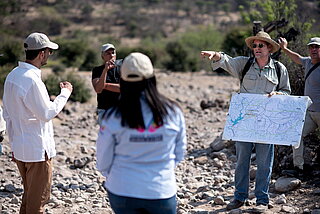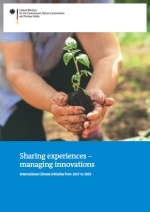Ecosystem-based approaches to tourism

Droughts, floods and storms characterise the image of climate change, but nature can protect itself against its own forces and it can also help the tourism industry.
Intact ecosystems provide important services for humans. They maintain soil fertility, for example, and produce clean water and air. At the same time, they protect against the impacts of climate change, mitigating droughts, floods and storms and other natural hazards to life. Strategically using and promoting these important ecosystem properties to make nature and humans more resilient is referred to as “Ecosystem-based Adaptation” (EbA). This approach also combines other advantages. The recreational use of the landscape increases, for example, which has a positive effect on health and the quality of life. Moreover, new jobs are created in sectors such as sustainable agriculture and tourism, a development that boosts the economic performance of entire regions.
The “Ecosystem-based Adaptation to climate change in cooperation with the private sector in Mexico” project (ADAPTUR - Adaptación al Cambio Climático basada en Ecosistemas con el Sector Turismo) supports adaptation to climate change in three Mexican tourism regions: San Miguel de Allende, Guanajuato, Riviera Nayarit (Jalisco), and the Riviera Maya in Quintana Roo. The project develops various measures in these areas to protect and restore the main ecosystems, such as the Mesoamerican coral reef, coastal wetlands, lagoon systems and resilient green belts around urban areas.
The measures primarily serve to reduce economic risks for tourism enterprises, which is why the project supports partnerships between the private and the public sectors. In this way, private companies are made aware that they should address the impacts of climate change and its risks in their corporate planning. The project also anchors the aspect of biodiversity in the sense of “mainstreaming” in tourism planning measures and programmes of the public and private sector. The strategy of the Mexican Tourism Secretariat, for example, has been updated with criteria for climate change mitigation and ecosystem-based adaptation.
The link has been copied to the clipboard
Contact
IKI Office
Zukunft – Umwelt – Gesellschaft (ZUG) gGmbH
Stresemannstraße 69-71
10963 Berlin
The IKI Annual Report 2017 to 2019
Sharing experience – managing innovation
Even more information on the developments of the IKI in the years 2017 to 2019.




